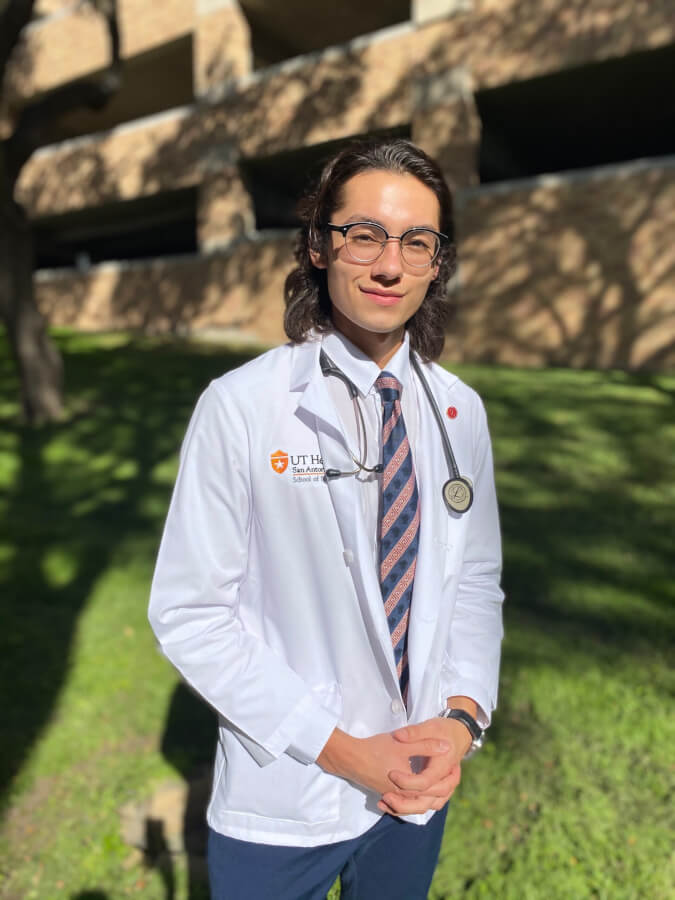Graduating from the School of Nursing on May 21 is an accomplishment Fernando Anaya-Vasquez could not have imagined five years ago. The son of El Salvadoran immigrants, Anaya-Vasquez, 23, said he made average grades in high school and was unsure what to do with his life.
Growing up in an immigrant family presented many challenges, including financial strains, frequent moves, cultural barriers and at times, isolation. However, these all factored into making him stronger in earning his Bachelor of Science in Nursing degree during the COVID-19 pandemic.
His graduation also takes place during the same month as National Nurses Week, May 6–12, which includes National Student Nurses Day on May 8. His experiences and those of his classmates represent the obstacles many student nurses have experienced learning their profession during the challenges of the pandemic.

Anaya-Vasquez’s parents came to San Antonio about 20 years ago with two young sons. They worked hard so that the family could move into neighborhoods with better schools. His mother, Ana, waited tables during the day and his father, Carlos, worked evenings in fine dining.
“I’ve always admired my parents for their courage and the sacrifices they’ve made to get [to the U.S.], just so their children could have an opportunity to succeed. I’m so grateful to them every day for making that decision,” Anaya-Vasquez said.
Their sacrifices resulted in Anaya-Vasquez’s older brother, Luis, working toward his PhD in civil engineering at the University of California, Berkeley, and Anaya-Vasquez’s aspiration to become a psychiatric mental health nurse practitioner.
However, their successes have not come easily. Often their parents were not able to advise them because they had not had similar experiences. “Part of being a first-generation college student is the stress. You don’t really have a lot of higher education support from family. You don’t know what moves to make or if the move you make is going to be the best for your career because you don’t have anyone in your family to ask. You just try to figure it out on your own,” he said.
His own struggles during high school fueled his interest in behavioral health, he said.
“I found myself isolated from friends and family for some time and ended up in an inadequate position in terms of my mental health,” Anaya-Vasquez explained. He decided to visit his brother in San Francisco after graduation, and that cemented his educational path.
“I walked down the streets and saw used needles lying in the middle of the sidewalk, homeless people injecting themselves right in front of me, countless people walking around shaking and quivering. The sight fueled an enormous amount of empathy and compassion for those who were affected by substance abuse and suffering from mental disorders. I felt that I could offer them help with more than just money for food, so I decided I would pursue a career in nursing, specializing in behavioral health,” Anaya-Vasquez said.
Attending San Antonio College was like turning a new page in life. He found he was good at science courses and as his confidence grew, he ended up earning a 4.0 grade point average in his prerequisite courses for nursing. Through his connection with a mentor, he was introduced to the National Latino Behavioral Health Association and was selected to serve as the only student on its board of directors, and as one of six junior scholarship coordinators for the organization.
His leadership path continued when he started nursing school at UT Health San Antonio when his cohort of traditional nursing BSN program students elected Anaya-Vasquez president in November 2020. His leadership spanned one of the most difficult educational periods for the School of Nursing, as the cohort began classes in fall 2020 during the heart of the COVID-19 pandemic.
As the cohort concludes its academic journey, Anaya-Vasquez urges classmates to recall why they decided to become nurses.
“Now it’s our time to promote health, prevent disease and make health care accessible for all. It’s important to remember why we came here and why we decided to take this journey.”
As for his path forward, Anaya-Vasquez sees many opportunities in the behavioral health field to address: the stigma of mental health, especially in the Latino community, where the population is affected by a lack of accessible resources, mental health education and vast disparities in access to care.
“I want to be a part of the solution where we raise awareness for the Latino community and guide our communities to have a more genuine understanding of mental health that will hopefully begin dismantling the stigma,” he said.
He is expected to begin this new journey as a professional nurse in June.

